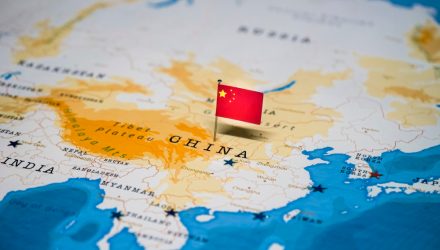The U.S. and China are home to the world’s two largest economies. So, it’s not surprising that they’re leading the way in terms of artificial intelligence (AI) expansion and usage cases. It’s also not surprising that this pair of behemoths are butting heads on the AI front.
That’s a competition investors cannot ignore. Accordingly, it appears many have opted for the comforts of U.S.-based technology companies and related ETFs as avenues for accessing the AI investment thesis. That domestic bias has been validated in part by the struggles of Chinese stocks. However, China’s AI commitments cannot be ignored.
Markedly, the country’s efforts to beat the U.S. in artificial intelligence could have tangible benefits for patient investors and the KraneShares CSI China Internet ETF (KWEB) stands as one example of an efficient avenue for U.S. investors seeking exposure to the China AI theme. KWEB offers multiple benefits, including its status as a China ETF most beloved by U.S. investors. Additionally, its holdings trade at a significant discount relative to U.S. peers.
KWEB Could Be an Ideal Play on China AI
KWEB is typically viewed as a play on Chinese internet equities, a trait advertised by its name. However, many of the fund’s components have the capabilities and resources needed to drive China’s AI ambitions. In fact, that transition could prove rather seamless given the country’s track record with other disruptive, innovative technologies.
“China has proven adept at commercializing transformative technologies and tailoring them for its massive user base at an unprecedented scale. The country’s internet firms took mobile internet adoption to new heights by developing products finely tuned for China’s hundreds of millions of users and the immense data they generate,” according to KraneShares research.
Alibaba (BABA), which is KWEB’s second-largest holding, is a prime example of a Chinese internet company that’s making significant artificial intelligence investments. Those include a stake in Moonshot AI and the use of language learning technology to improve the consumer experience on Alibaba platforms.
Those moves are drawing comparisons to what some familiar mega-cap U.S. companies are doing on the AI front. This indicates that KWEB could have long-term potency as a China AI play.
“There could be synergies between AI initiatives and Alibaba’s cloud business similar to those between Microsoft Azure and OpenAI. And those between Amazon Web Services (AWS) and Anthropic. As in these examples, Ali Cloud could be turbocharged by integrating generative AI capabilities. Many internet companies in China have used Ali Cloud,” added KraneShares.
Tencent (TCEHY) is KWEB’s largest holding. The ETF also holds NetEase. They are more examples of well-known Chinese firms that are bolstering their AI footprints.
“By leveraging generative AI, gaming companies like Tencent and NetEase aim to accelerate development cycles, reduce production costs, and deliver more innovative and compelling gaming experiences to players. This technology has the potential to reshape the gaming industry’s creative processes and business models, unlocking new avenues for revenue growth and user engagement,” concluded KraneShares.
For more news, information, and analysis, visit the China Insights Channel.

